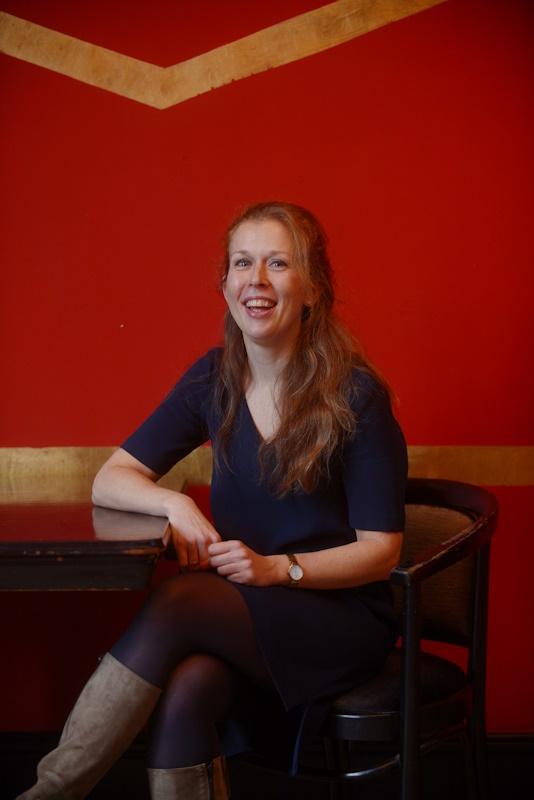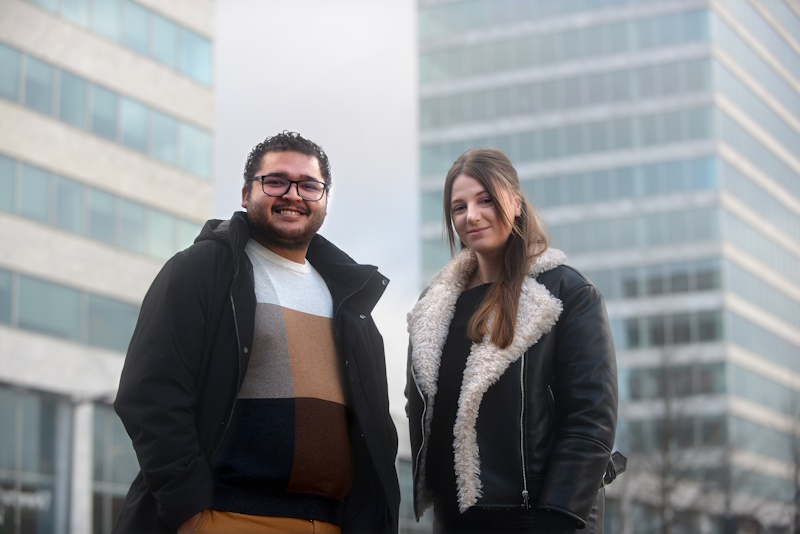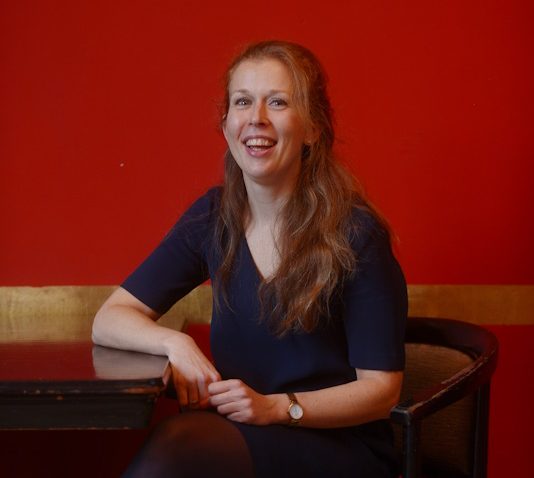Study success is declining. And roughly half the students suffer from mental problems. It is also becoming increasingly difficult to involve them in activities in class and events outside of class. Charlotte Vissenberg, together with students, conducted a research into the deeper causes behind this worrying development.
You have done research into ‘sense of belonging’. Can you explain what that is?
‘In short, this is the extent to which students feel involved, seen and heard in their educational environment. We chose this because it has a direct relationship to study success and mental health. Student participation is an expression of sense of belonging. In short, everything starts with that sense of belonging. We opted for first-year students because we wanted students who had not experienced the COVID-19 pandemic during their studies, because if that were the case, this could be an additional point of attention for teachers and this group is more representative of the students who are currently at school here and will come to study here in the future. And we also know that successful onboarding and involving new students in the school and training is an important condition for the development of that sense of belonging. At the time of the research, the first-year students were at the end of their first year and were therefore able to tell us how they experienced it.’
And what is student life like now?
‘We see that their daily lives are very busy, that they experience a lot of stress and that school is just one of the balls they have to keep in the air. They think school is important, very important often, but they still have a lot of other things to do. They have to work, often a lot to make ends meet; the home situation demands attention, and then there is their social life…. The result is that many of them approach school life very rationally. They are only present when they need to be.’

Do they think that’s a shame? Are they concerned?
‘They are certainly wondering: am I going to make it? Our research shows that they are torn between these different demands. They want to pay more attention to school, they often regret missing activities, but they can’t do it.’
And does that also mean that their sense of belonging disappears?
‘You can see that the pressure has a lot of influence on this. The way they interact with fellow students becomes different, more businesslike. There is less connection with the building, students indicate that they only come to school for lessons or assignments. Doing something fun with your fellow students is often seen as a waste of time or unnecessary, and students often say that they have other things to do. If there is a break, they go home to have a sandwich. To be honest, we were a bit shocked by that. We really thought that student life would be different.’
Did it shock you?
‘I think it’s a shame. That it is at the expense of one’s own development.’
The deeper causes are of course social….
‘You see, and this has also emerged from other studies, that the social security of young people is under great pressure. They are disproportionately affected by inflation, rising energy prices and rents. The basic grant is too low; the compensation for the loan system is far too low. Student debt is increasing, which in turn causes extra stress. The number of young people who want to leave home but cannot have doubled in recent years. And then purely on a mental level there is the high pressure to perform, in combination with individualization. Everyone feels responsible for making their own life a success. As a result, young people experience more competition among themselves and less support from fellow students. And in the meantime, if you don’t do it right, it’s your own fault. And that is often not true at all.’
And then Windesheim also puts emphasis on coming up with your own learning route…
‘An interesting point, you can ask questions about that based on this research. Professional literature and recent studies into performance pressure often indicate that there should be less emphasis on students graduating within the four years. The personal learning route is usually mentioned as a solution, but what is often meant is the student’s personal study pace. At Windesheim the emphasis seems to be more on freedom of choice in terms of the content of the course. What can Windesheim do to relieve that pressure? ‘As a university of applied sciences, you cannot immediately do anything about all these social factors. But the focus on nominal graduation, within four years, creates extra pressure, especially because this involves selection moments such as a BSA or obtaining a propaedeutic diploma. These are moments when students look around and compare themselves with others. We know that that is not helpful when it comes to performance pressure. Another example, provided by students: to the propaedeutic ceremony we only invite students who have passed their propaedeutic year. Others are not invited – but all students move on to the second year. Why the exclusion? This does not necessarily contribute to the feeling of sense of belonging or to reducing performance pressure. I think it is wise for Windesheim to take a critical look at where we are unintentionally increasing the pressure to perform. ‘It is in any case interesting to compare the results of this research with our course. The new institutional plan emphasizes ‘Closer together, it aims to bring the college, teachers and students together even more. But it is clear that larger social forces are standing in the way of that involvement.’
What would the students like to see so that they feel at home at Windesheim?
‘What we saw is that students talk about sense of belonging in a different way than teachers. Students talk about a community of students, teachers and employees. They want to be seen, greeted, participate in class, and be equal. They often talk about teachers, who are really very important. While teachers, when they talk about the sense of belonging, are mainly talking about the bond between students. They indicate that it is their job to facilitate bonding between students, but that the level of involvement ultimately remains the responsibility of the student. Windesheim talks about “closer together” but who is getting closer to whom?
It’s a shame that teachers act this way.
‘Let me say right away that teachers are of course busy enough and that there are major differences between courses and teachers. The extent to which courses organize activities and the extent to which teachers are present varies greatly. And then there are major differences in role views and how you shape that. That is why I sometimes wonder whether sense of belonging should not be given a much clearer place in the curriculum, so that a team can develop a vision on it.’
Will there be room for the “old-fashioned” teacher?
‘I recently spoke about this with the director of a healthcare organization in Almere and he responded: But that is not possible, that students are so dependent on teachers!? They have to stand on their own feet! He has a point there, I thought, but they are also freshmen. A good sense of belonging must be the starting point for developing into a solid professional. And the study programme can stimulate this development. It can therefore be valuable to think about what place we want to give this in the curriculum and what this should look like in year 1 and year 4.’
That director you spoke to is the type: don’t pamper them, they have to persevere…
‘I think we should take students more seriously. We talk too easily about becoming more resilient, but we need to take their experiences seriously and support them better. And remember, the group has changed. We have worked hard in recent decades to improve the accessibility of education. This has ensured that we have a more diverse student population, with more students with less income, students who enter from MBO, more first-generation students where it is not always self-evident that parents, for example, contribute financially. Then we must also ensure that they can take the opportunities offered. When Almere had to close due to the COVID-19 pandemic, a large number of our students suddenly no longer had a study place. And we know that there are students now who use part of their student loans for energy costs.’
And this problem won’t go away today or tomorrow.
‘No. The social trends such as the high pressure to perform, the belief in feasibility, our high standard of happiness, the hunt for the most theoretical diploma possible… I don’t expect things to get much better anytime soon.’
Did your research also yield practical recommendations?
‘There are many recommendations from our research. Ensure that activities have as little impact on students’ lives as possible; reward participation with study points; make sure there are no holes in the schedule; Make it clear to students what they are entitled to and where they can go if they have problems. And listen to them. Ask for feedback and take this feedback seriously. It can be done very simply. Discuss the news together if necessary. Putting a pot of tea and cookies in your classroom and then studying together works very well. Or spend the last fifteen minutes of the lesson on the questions that students have. Students are always very surprised when they notice that teachers are really involved in their well-being.’
Charlotte Vissenberg is Associate Professor of Family & Resilience, Professorship Customer perspective in Support and Care. The research has been published on www.windesheim.nl/onderzoek/lectoraten/ klantenservice-in-steun-en-zorg
Text: Marcel Hulspas
Photos: Jasper van Overbeek
‘Some told entire stories’
HRM student Ilse Folmer and nursing student Gershwin Chundro participated in the research into Sense of Belonging.
Was it difficult to speak to students?

G: ‘No, that went quite well. I am a student coach for the first-year students of my course, so making contact was easy.’
I: ‘The students in my course are a bit less accessible, I would say. More businesslike. So to find participants I continued searching and approached people in all kinds of places. That went fine. It only took fifteen minutes or so.
G: ‘Some students gave very short answers, others wanted to say a lot. Sometimes, I had to explain what Sense of belonging means; How involved are you? Some found that interesting, others not at all. Some really said: the school should do more of this or that…’
I: ‘Many of them really had something to say. They were really like: this is the time to do that and then they told entire stories.’
And did they come to the events that Windesheim organizes?
G: ‘Windesheim organizes many events and I think there is something for everyone. But you still notice that students don’t go there. Some are just not interested, or they say: I had to work, or play sports, or go to a festival. They don’t go for a variety of reasons.’
I: ‘The school is no longer number one. There is school, but also work, and sports, and home. I recognize that, exactly the same applies to me.’
G: ‘I go to events quite often, but I also skip them.’
Do students complain that they are too busy?
G: ‘I spoke to a student who was also doing an internship and also had to work, so he really had no time for spontaneous events. I can relate to this.’
I: ‘Me too. There is also so much that you think to yourself: not right now, I’ll skip it this time. I did not go to the three-day Parade myself. Afterwards you hear how much fun it was, and then you regret not going a little.’
And that doesn’t make students friends either…
G: ‘That varies. Some are collegial, others spend a lot of time together. What I did notice is that foreign students form one or multiple groups, and the Dutch students form a group. There is no clash, they work well together but when they go out there is no communication about where they are going.
I: ‘As soon as you can have a nice glass of wine or a beer somewhere, there are others who say: never mind. Then I sometimes think; that’s it? But everyone has their own reasons.’
And what is the relationship with teachers?
I: ‘Teachers and students have a different view on “going to school”. Teachers actually know very little about the lives of students. They clearly stated this in the focus groups. They have a certain representation but it is really outdated. They think that school is the students’ main priority, but that is no longer the case. Students think: I’ll go to my subject, I’ll pass my tests, and I’ll move on…’
G: ‘Some people look at it that way, but the majority want to build a bond with teachers. Sometimes it goes very well, sometimes it doesn’t. In the latter case, students want to see improvement but they don’t know how.’
Could you see that students suffer from stress?
G: ‘Certainly!’
I: ‘The costs have been so high lately, and the basic grant is far too low. There needs to be extra income and that is especially a source of stress.’
